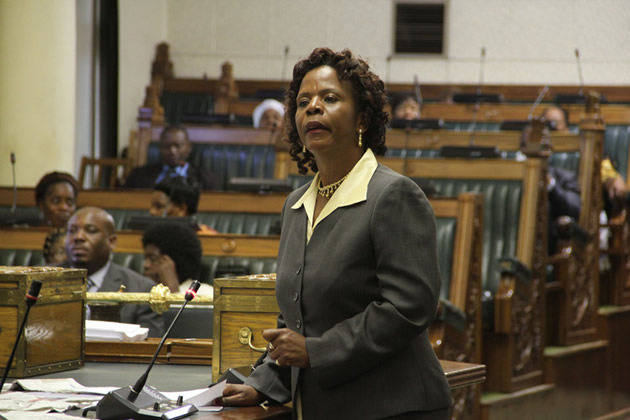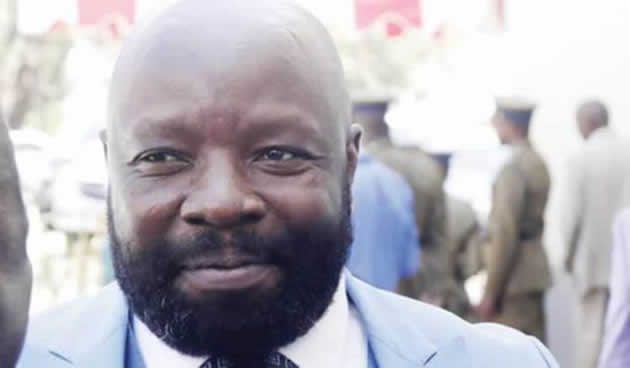Likening children to MPs is an insult


Instead of portraying themselves in good light based on the questions they ask, some MPs have abused the platform by seeking to make our Parliament resemble that of South Africa, a place to heckle others
Lloyd Gumbo Mr Speaker Sir
Oftentimes, troublesome Members of Parliament across the world have been likened to children because of the “childish” manner in which they behave when in the House, but if children watched them, they would feel really insulted.
Why?
Because no matter how naughty they are, when children are told to shut up and behave, they oblige but not with our MPs.
Sometimes you would mistake Parliament for a monkey show as their behaviour does not depict that of human beings.
Mr Speaker Sir, South African Parliamentary Speaker Baleka Mbete last week made an interesting comment about the behaviour of that country’s MPs when she said they behaved better when there were no cameras but go wild the moment cameras focused on them.
“I hasten to add that away from the television cameras, the spirit amongst all members across the political parties is generally very collegial, constructive and friendly,” she opined.
“Members of the public don’t know that many friendships are formed across political parties. It is only when the eyes of the television cameras are turned on honourable members that the ‘sugar rush’ tends to kick in and members disobey the chair, as they do.”
This is exactly what this column warned of when the ZBC started broadcasting live Question Time sessions on Wednesdays.
Instead of portraying themselves in good light based on the questions they ask, some MPs have abused the platform by seeking to make our Parliament resemble that of South Africa.
Mr Speaker Sir, while some locals have confused the foolishness of the Economic Freedom Fighters MPs for robustness, our own MPs have blindly decided to take a leaf from them by seeking to make the House ungovernable.
The circus in the House last week following a ruling by the chair in which MDC-T MPs openly challenged him presents the greatest challenge that our Parliament now faces.
It is clear that opposition MPs feel useless when they see the mayhem that EFF causes in the South African Parliament so they would want to go back to the days of Job Sikhala, Tongai Matutu and the late Learnmore Jongwe in the early 2000 when they made Parliament ungovernable.
Mr Speaker Sir, the noise last week saw Parliament lose about an hour of the one and half hours of the questions without notice session thereby denying Zimbabweans an opportunity to have their questions asked or answered.
Parliament represents the generality of Zimbabweans, thus has a critical role in the life of country, as such it must be treated with utmost respect.
Mr Speaker Sir, imagine if other arms of the State, i.e, the Executive and the Judiciary, were to behave in the same manner as the MPs.
Could the behaviour of some MPs be the reason people have lost respect for the legislature?
As things stand, it is very much likely.
This boils down to who gets elected into Parliament as some of them have no respect and very little integrity. As such voters must be more circumspect about who they elect as MPs.
By virtue of being honourable members, MPs must behave to the highest ethical standards as provided for in the Standing Orders.
What they must appreciate is that Standing Orders are not necessarily about rights only, but rules too as their purpose is equally to set rules of conduct of proceedings in the House, lest it becomes a circus as what happened on Wednesday.
Mr Speaker Sir, the reason proceedings of the House are governed and controlled by the chair is to bring and instil discipline in the manner in which Parliament conducts its business.
While MPs are quick to hide behind the Privileges, Immunities and Powers of Parliament Act that protects them against prosecution for whatever they say during Parliament’s sittings whether in the House or committees, they must not abuse that provision because their rulebook, which is the Standing Orders, does not give them carte Blanche to behave as they please.
For instance, the current Speaker of the National Assembly, Advocate Jacob Mudenda has been strict on insisting that whenever legislators allege something that has the potential to damage another’s reputation, it must be supported by facts.
He has not banned MPs from raising allegations but the condition is that they must not abuse their privileges to go about offending other people under the cover of their immunity.
This seeks to guard against MPs taking bar talk and presenting it in Parliament as facts.
For instance, recent claims by Goromonzi West MP Beatrice Nyamupinga that there were more than 200 Zimbabweans on death row in China cannot go unchallenged because that is a wild figure that she made up.
Whether she got the statistics through her relations at the Ministry of Foreign Affairs is neither here nor there; the fact is the figure is outrageous to say the least.
These tendencies to throw figures around have the potential to poison Zimbabwe’s relations with other countries while at the same time discrediting MPs.
Mr Speaker Sir, the greatest challenge is that there are gullible people and media who will take everything that is said in Parliament as gospel truth even if an MP claims that Mt Kilimanjaro is in Zimbabwe. They will not question the authenticity of such claims and the source.
It is for that reason that the chair demands that everything that is said in Parliament must be factual.
And when the chair tries to bring order and MPs disobey, the Standing Rules empower whoever is in the chair to boot them out of the House so that proceedings can proceed smoothly.
Obviously there are remedies for those who feel aggrieved by rulings of the chair, which include making representations through their respective party chief whips or to challenge them at the Constitutional Court as was stated by Speaker Advocate Jacob Mudenda last week.
However, it is equally important that whoever is in the chair conduct themselves in a rational manner in arriving at their decisions.
Being heavy-handed does not always yield the desired objectives; as such there must be mutual respect between the chair and MPs.
The decisions or rulings of the chair must be well-thought out and without reproach to avoid a situation where they are challenged and the chair is forced to reverse his/her earlier decision.
The moment the chair is forced to reverse their earlier decision, it takes away the respect that covered them and sets a bad precedence where MPs can continue to challenge the chair on whatever decision they make.
Mr Speaker Sir, while the chair’s rulings are final, it is important that when an MP raises a Point of Order as is provided for in the rulebook, they are recognised so that they can make their submission and when they are Out of Order, the chair can still rule them Out of Order instead of blocking them.
It is at the stage when the MP decides to be a nuisance that the chair can then chuck them out.
It is equally important that MPs do not abuse the Point of Order provision to bring House business to a standstill.
The idea is to represent the electorate and not to play to the gallery, especially when television cameras are beaming.
- Feedback: [email protected]









Comments